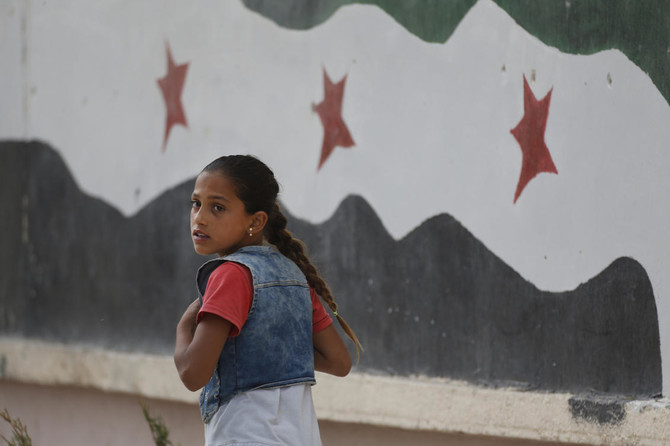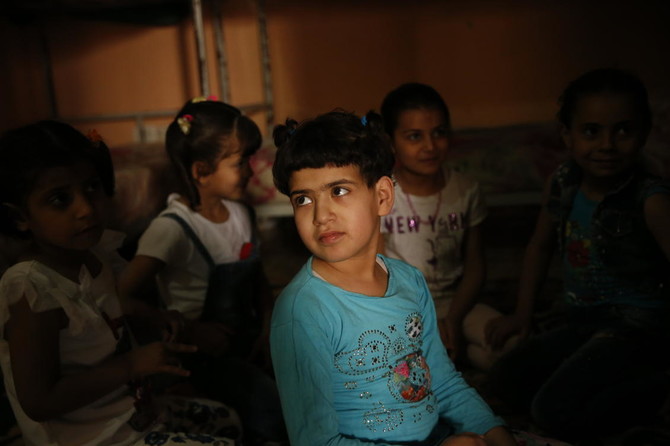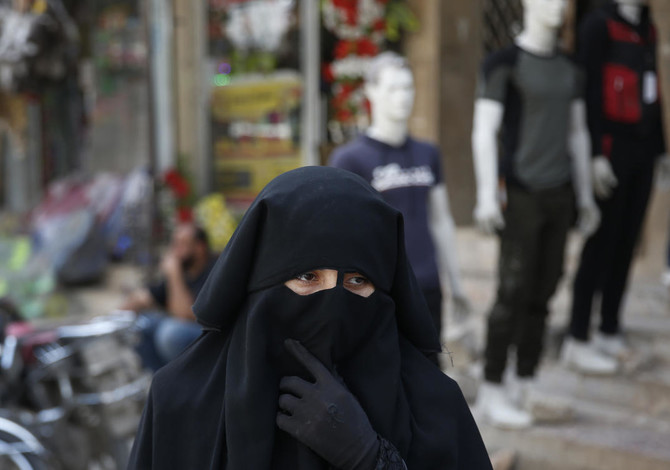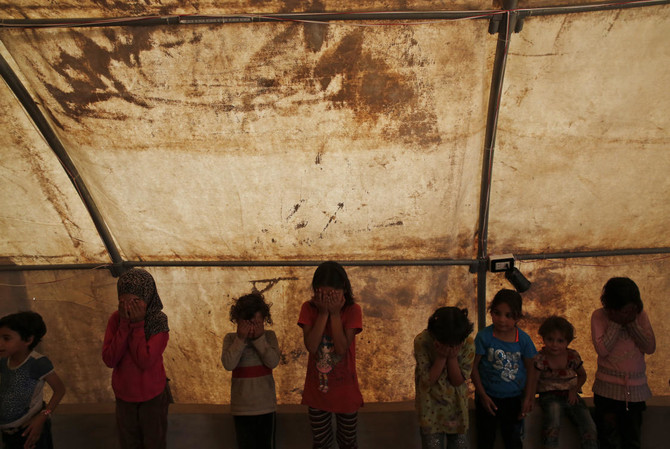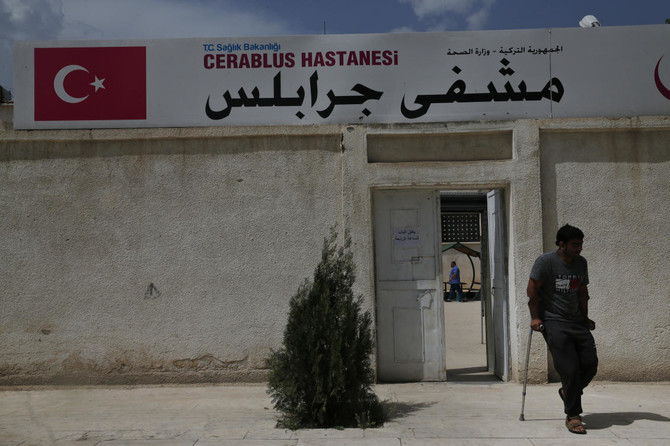JARABLUS, Syria: When Hikmat’s mother managed to sneak back into their home city of Aleppo, now controlled by government forces, she found a single word spray-painted in red on their house: “Confiscated.” Same with the family store and another house. Their farm, south of the city, is probably lost to them as well, in territory recently recaptured by Syrian forces.
This is the new reality for displaced Syrians who supported the armed opposition challenging President Bashar Assad or who lived in areas once held by the opposition. Now driven elsewhere, they face the prospect that they may never be able to return.
Around half of Syria’s pre-war population of 23 million has been uprooted — the overwhelming majority of them Sunni Muslims, who were among the first to rise against the government in 2011. Nearly 6 million fled abroad, while 6.6 million are displaced within Syria.
Roughly a third of the displaced are crammed into areas that remain outside government hands in northern Syria: rebel-held Idlib province and a neighboring Turkish-controlled enclave. Thrown together from different parts of the country, they have to adjust to a strange new hybrid society where former city dweller and former village farmer, uneducated and educated, liberal and conservative now live side by side in tent camps or rented homes, with different accents, cuisines and customs.
They all share the realization that this may be their future.
“I see this as a long-term thing. It is not a year or two and we will return. No!” Hikmat said, speaking recently in Jarablus, a Turkish-administered town in northern Syria. “All (our properties) are gone.”
He spoke on condition he be identified only by his first name to protect his family, because some relatives can still access government-held areas.
As the government regains control of opposition areas further south, the number of displaced constantly grows. UN officials say 2018 has seen the largest wave of displacement since the war began in 2011. The government has called on those who left homes to return, but the military victories are often followed by revenge attacks and unilateral confiscation of properties by government militias.
Separately, a new property law, known as Law 10, allows the government to expropriate properties it deems abandoned in areas zoned for development. Expropriations under the law haven’t begun, but already the government has zoned off recaptured suburbs of Damascus for redevelopment, meaning many homes would be vulnerable because residents are gone, mostly to the north.
That has triggered accusations the law is part of a design to socially engineer a new Syria, a charge the government denies.
“This law is not about dispossessing anyone,” Assad said in an interview in May with the Greek newspaper Kathimerini. He said opponents were trying “to create a new narrative about the Syrian government in order to rekindle the fire of public opinion in the West against the Syrian government.”
Broad outlines of demographic shift are clear.
The government now holds just over 60 percent of Syria’s territory, and there are still Sunnis in those areas, though there are no firm figures how many. But the Sunni population has been greatly reduced in the heartland of Syria — the Mediterranean coast and the belt of the most prosperous, cosmopolitan urban areas, running from Aleppo in the north down to Damascus. In the process, the government reinforced its support base, traditionally among minorities who depend on Assad.
Hikmat, who was once a radiologist, said he believed his house in Aleppo was seized by government supporters known as “shabiha” in revenge because, in 2012, when his part of the city broke away from the government, opposition fighters defeated the local shabiha militia and confiscated its commander’s property.
Since fleeing Aleppo in 2016 as government forces retook rebel-held sections of the city, Hikmat has had to move twice more before ending up in Jarablus. Some displaced have had to move as many as two dozen times, getting further from their homes.
Now Hikmat is dealing with life in the territory he and other displaced refer to as the “rural north,” almost as if it’s a new province.
He lamented the loss of cosmopolitan Aleppo. His clinic was in one of the city’s posh neighborhoods, his boss was an Armenian, his colleagues Christians. In Jarablus, he runs an orphanage for children from Aleppo, and he worries that here they are forgetting city life.
The kids are losing their distinct Aleppo accent, their last link to their home, he said. Aleppo is known as Syria’s food capital because of its elaborate dishes, and the food habits in their new home were a shock to some of the children. Some of them laughed at a teacher — himself displaced from eastern Syria — for eating a traditional plate of rice and meat with his fingers.
Omar Aroub, who was evacuated more than 14 months ago from his home in the city of Homs, still can’t find a job. Homs was once the heart of the uprising against Assad but is now almost empty of its Sunni population.
The 20-year-old Aroub lives in a tent camp in Jarablus with hundreds of others displaced from his Homs neighborhood of Al-Waer. Theirs was the last district of the city to fall after years of bombardment and siege that wreaked destruction and pushed residents to near starvation.
He said the only work in Jarablus was to join one of the Turkish-backed armed groups. A neighbor who joined makes $90 a month and has begun building a house.
“Everyone is now building houses because they realized they’re going to be here for a while,” Aroub said.
Newly displaced Umm Khaled can’t fathom what life has come to. She arrived in April in Al-Bab, another Turkish-administered town, escaping the government capture of Ghouta, a once relatively prosperous agricultural region on Damascus’ outskirts.
She finds it unbearable being crammed into a tent camp with few services and hundreds of others. People from her hometown of Douma, in Ghouta, are more conservative and the men keep heavy watch over the women, she said. She covers her face with a veil and wears gloves.
“This life is not for us,” she said. “We Doumanis are difficult. Our men are difficult. ... There will be problems between the different people because of different mentalities.”
Abdulkafi Alhamdo, a 33-year-old English teacher, has run into cultural differences after fleeing from Aleppo to Idlib, the last remaining opposition stronghold. People there regularly drop by each other’s homes, while Aleppans are more private, he said, so his new neighbors were flustered.
“They say why are they not visiting us? Are they upset?” he said.
His Aleppo accent also stood out, bringing jokes from his students.
All that was fine, but he said he was hurt when Idlib locals accused him of failing to defend Aleppo and questioned his sacrifices in one-upmanship over who paid a higher price for the cause.
When Alhamdo and his colleagues decided to commemorate their expulsion from Aleppo, locals asked them not to, fearing a gathering could draw government airstrikes.
The experience, he said, has made him more compassionate for newcomers as thousands more continue to roll in, mostly Sunnis, impoverished and staunchly anti-government.
Coming here “is easier than going to the regime hell,” he said. “Demographic change ... is the worst thing that happened in Syria, much worse than the destruction.”
Syria’s uprooted adapt to coexisting on the margins
Syria’s uprooted adapt to coexisting on the margins

- Around half of Syria’s pre-war population of 23 million has been uprooted
- As the government regains control of opposition areas further south, the number of displaced constantly grows
Released Palestinian student to help launch immigrant legal aid initiative in Vermont

- Mohsen Mahdawi, 34, who led protests against Israel’s war in Gaza at Columbia University, spent 16 days in a state prison
- “We will not fear anyone because our fight is a fight for love, a fight for democracy, a fight for humanity,” Mahdawi told supporters
VERMONT: A Palestinian student arrested during an interview about finalizing his US citizenship is helping to launch an initiative to help other immigrants facing deportation in Vermont on Thursday, a week after a federal judge freed him from custody.
Mohsen Mahdawi, 34, who led protests against Israel’s war in Gaza at Columbia University, spent 16 days in a state prison before a judge ordered him released on April 30. The Trump administration has said Mahdawi should be deported because his activism threatens its foreign policy goals, but the judge ruled that he has raised a “substantial claim” that the government arrested him to stifle speech with which it disagrees.
Immigration authorities have detained college students from around the country since the first days of the Trump administration. Many of them participated in campus protests over the Israel-Hamas war, which has killed more than 52,000 Palestinians. Mahdawi was among the first to win his freedom after challenging his arrest.
“Justice is inevitable. We will not fear anyone because our fight is a fight for love, a fight for democracy, a fight for humanity,” Mahdawi told supporters outside the courthouse last week.
He will join Vermont State Treasurer Mike Pieciak, Senate Majority Leader Kesha Ram Hinsdale and community advocates at the Statehouse to announce the Vermont Immigration Legal Defense Fund. The group, which also includes lawyers and philanthropists, says the goal is to improve access to legal advice for immigrants and build long-term infrastructure within the justice system as it pertains to immigration law.
Members of Vermont’s congressional delegation have spoken up on Mahdawi’s behalf, as have state politicians. Vermont’s House and Senate passed resolutions condemning the circumstances of his detention and advocating for his release and due process rights.
Republican Gov. Phil Scott has said there is no justification for the manner in which Mahdawi was arrested, at an immigration office in Colchester.
“Law enforcement officers in this country should not operate in the shadows or hide behind masks,” the governor said the next day. “The power of the executive branch of the federal government is immense, but it is not infinite, and it is not absolute.”
Mahdawi, a legal permanent resident, was born in a refugee camp in the Israeli-occupied West Bank and moved to the United States in 2014. At Columbia, he organized campus protests and co-founded the Palestinian Student Union with Mahmoud Khalil, another Palestinian permanent resident of the US and graduate student who was arrested in March.
His release, which is being challenged by the government, allows him to travel outside of his home state of Vermont and attend his graduation from Columbia in New York later this month.
UN chief voices ‘grave concern’ after Sudan’s aid hub rocked by 5 days of drone attacks

- Port Sudan is the country’s main entry point for humanitarian aid
- Country’s brutal civil war has killed tens of thousands, displaced millions
NEW YORK CITY: The UN secretary-general has voiced “grave concern” over repeated drone attacks on the eastern Sudanese city of Port Sudan, the country’s main entry point for humanitarian aid.
The city faced a new drone strike on Thursday for the fifth consecutive day amid a fierce confrontation between the Sudanese Armed Forces and Rapid Support Forces paramilitary.
The attacks have led to an exodus of civilians from the city, which hosts UN offices and aid agencies, and is the seat of power of the army-backed government.
Sudanese army officials have blamed the RSF for the strikes, which have targeted the city’s port, largest operational fuel depot, central power station and airport, among other sites.
UN Secretary-General Antonio Guterres warned that the attacks “threaten to increase humanitarian needs and further complicate aid operations in the country,” his spokesman, Stephane Dujarric, said on Wednesday.
“The secretary-general is alarmed at the expansion of the conflict into an area that has served as a place of refuge for large numbers of people displaced from the capital, Khartoum, and other areas,” he added.
Sudan’s brutal two-year-long civil war has killed tens of thousands of people and displaced more than 13 million.
The conflict has created “the biggest humanitarian crisis ever recorded,” the International Rescue Committee has said.
“The secretary-general reiterates that all parties to the conflict must comply with their obligations under international humanitarian law,” Dujarric said.
“They must not direct attacks against civilians and civilian objects; must take all feasible precautions to avoid, and in any event to minimize, incidental civilian casualties; and must allow and facilitate rapid and unimpeded passage of humanitarian relief for civilians in need.”
Almost all humanitarian aid enters the Northeast African country through Port Sudan.
The Chinese Embassy in Sudan on Thursday called on all Chinese citizens to leave the country as soon as possible.
Guterres is “concerned at the lack of political will of the parties to return to the negotiating table, preferring instead to continue pursuing their military objectives,” Wednesday’s statement said.
“The secretary-general calls on the parties to engage constructively with the mediation support mechanisms already in place to assist the parties to reach a political solution, underscoring the UN’s continued support to help find a way out of this crisis.
“He renews his call for an immediate cessation of hostilities and stresses that dialogue is the only way to achieve the peace that the people of Sudan demand.”
Syria believed to make no purchase in 100,000 T wheat tender, traders say

- Traders said Syria could issue a new purchase tender soon
- Shipment was sought within 45 days from the contract award
HAMBURG: A Syrian state grains agency is believed to have made no purchase in an international tender seeking 100,000 metric tons of milling wheat which closed in April, European traders said on Thursday.
Traders said Syria could issue a new purchase tender soon.
Shipment was sought within 45 days from the contract award.
Syria had bought about 100,000 tons of wheat in its previous tender reported on March 25, which was believed to be the first large purchase tender since the change of power in Syria late last year.
But the donation by Iraq of 220,000 tons of wheat to Syria was expected to be used for Syria’s immediate import requirements, traders said.
Chinese embassy in Sudan urges citizens to evacuate amid security concerns

- The embassy warned of dwindling supplies of water, electricity and fuel
BEIJING: The Chinese embassy in Sudan on Thursday issued a statement urging Chinese citizens in the country to evacuate as soon as possible, citing deteriorating security situation and rising security risks.
The embassy warned of dwindling supplies of water, electricity and fuel, and advised citizens to evacuate via ships to Saudi Arabia or available international flights, or to travel by land to Egypt.
Drone strikes spark civilian exodus from army-controlled Sudan aid hub

- Port Sudan on the Red Sea coast had been regarded as a safe haven, hosting United Nations offices and hundreds of thousands of displaced people
- RSF drone strikes on Port Sudan this week hit key facilities including the country’s last functioning international airport
PORT SUDAN: Paramilitary drones struck army-held areas of eastern and southern Sudan for a fifth straight day Thursday, army sources said, prompting an exodus of civilians from Port Sudan, seat of the army-backed government.
Attacks targeted the country’s main naval base outside Port Sudan, as well as fuel depots in the southern city of Kosti, two sources said, speaking on condition of anonymity.
“The militia launched another drone attack on the Flamingo Naval Base north of Port Sudan,” one source told AFP on condition of anonymity, referring to the paramilitary Rapid Support Forces (RSF), at war with the regular army since April 2023.
Explosions were heard across the city, an AFP correspondent reported.
Port Sudan on the Red Sea coast had been regarded as a safe haven, hosting United Nations offices and hundreds of thousands of displaced people, until drone strikes blamed on the RSF began on Sunday.
The port city is the main entry point for humanitarian aid into Sudan, and UN chief Antonio Guterres warned the attacks “threaten to increase humanitarian needs and further complicate aid operations in the country,” his spokesman Stephane Dujarric said.
Nearly 1,100 kilometers (some 680 miles) to the southwest, in the army-controlled city of Kosti in White Nile state, RSF drones struck fuel depots, setting off massive fires, a military source said.
“The militia targeted the fuel depots that supply the state with three drones, causing fires to break out,” the source told AFP on condition of anonymity.
There were no immediate reports of any casualties.
More than two years of war have killed tens of thousands of people and uprooted 13 million, according to UN figures.
RSF drone strikes on Port Sudan this week hit key facilities including the country’s last functioning international airport, its largest working fuel depot and the city’s main power station.
An army source said air defenses had shot down 15 drones over the city overnight.
At Port Sudan’s bustling main bus station, civilians were scrambling to leave.
“You can’t get a ticket without booking over a day in advance now, all the buses are booked,” said bus company employee Mahmoud Hussein.
Among those fleeing was Haidar Ibrahim, preparing to travel south with his family.
“The smoke is everywhere and my wife suffers from asthma,” he told AFP. “We have no choice but to leave.”
Many of those who had sought refuge in Port Sudan have been displaced multiple times before, fleeing each time the front line closed in.
Transport costs have nearly doubled as a result of fuel shortages triggered by the attacks.
“Now, we have to buy fuel on the black market,” said tuk-tuk driver Abdel-Meguid Babiker.
On Wednesday evening, drones were also seen over the army-held eastern city of Kassala and northern city of Merowe, prompting anti-aircraft fire.
Eight-country east African bloc, the Intergovernmental Authority on Development (IGAD), called the attacks on civilian infrastructure in Port Sudan “unacceptable” and demanded an “immediate end.”
“Any assault on this critical hub further compounds human suffering and impedes the delivery of urgently needed assistance,” IGAD executive secretary Workneh Gebeyehu said in a statement.
The RSF has not commented on the drone strikes, which have hit targets hundreds of kilometers away from their closest known positions on the outskirts of greater Khartoum.
The paramilitaries have ramped up their drone campaign since losing control of nearly all of greater Khartoum to the army in March.
On Tuesday, the army-backed government severed ties with the United Arab Emirates, accusing it of supplying the RSF with advanced weapons systems.
The UAE denied the allegation, adding that the internationally recognized administration “does not represent the legitimate government of Sudan.”
The paramilitaries and their allies have moved to establish a rival administration in areas under their control.
Abu Dhabi has repeatedly denied arming the RSF, despite reports from UN experts, US politicians and international organizations.
The war has effectively split the country in two, with the army holding the north, east and center, and the RSF in control of most of Darfur and parts of the south.


